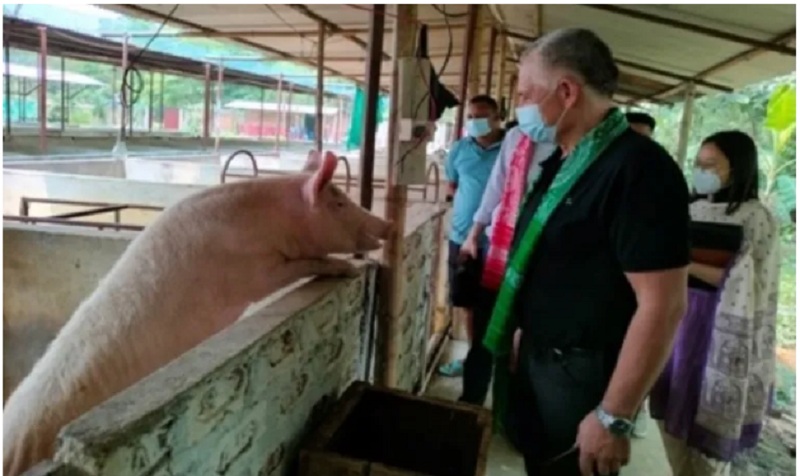Guwahati: The Bodoland Territorial Region (BTR) in Assam is embarking on an ambitious plan to achieve self-sufficiency in pork production by introducing a high-yield British pig breed and promoting scientific farming practices.
The initiative, known as the Bodoland Pig Mission, aims to bridge the significant demand-supply gap in a region where pork is a culinary staple.
Launched in 2021, the mission is a collaborative effort between the BTR government and two international organizations: the Netherlands-based Programma Uitzending Managers (PUM) and the Danish Consortium of Academic Craftsmanship (DCAC) of Denmark.
Currently, BTR’s annual pork consumption exceeds 25,000 metric tonnes, but local production satisfies less than 40% of this demand, forcing the region to rely on costly and disease-prone imports. The mission’s primary goal is to boost domestic output, focusing on modern breeding and fattening units and a comprehensive value chain for the pork industry.
To kickstart the program, the BTR government will be importing 260 Large White Yorkshire (LWY) pigs—250 females and 10 boars—from the Netherlands.
An LWY pig can reach a weight of 100 kgs within six months under proper scientific management.
“We don’t get a pure breed here, so we are bringing the LWY pigs for breeding,” said Pushpadhar Das, an Officer on Special Duty. “We expect them to arrive in January next year. Our farm at Baksa is under construction and should be ready in the next two to three months.”
The program is also exploring artificial insemination, with plans to import semen and maintain a database to prevent inbreeding. “We will bring semen at regular intervals until our breeding farms have a sufficient number of breeding stock,” Das added.
So far, 115 breeders have received training, and piglets born on their farms will be distributed to local farmers.
In the next phase, the collaboration with Denmark’s DCAC will focus on knowledge sharing for the entire pork value chain.
A team from BTR visited Denmark in 2023 to formalize an agreement for this partnership. The deal will include training for BTR farmers in Denmark and expert guidance on slaughterhouse design, cold chain maintenance, and value addition.
The BTR government has set a target of producing 1 lakh kgs of pork daily within six to seven years.
Das acknowledged that African swine fever posed a problem but noted that it had, fortunately, not yet affected the farms being nurtured in the BTR’s core areas due to their strict biosecurity measures. He added that the government was encouraging the development of larger community-based farms, with the goal of raising 300 to 1,000 fattened pigs per farm.
ALSO READ: Bodoland spins a new silk economy, blending heritage with opportunity
The shift to larger farms by moving away from traditional backyard farming is crucial for maintaining biosecurity and implementing good animal husbandry practices, which are essential for the project’s success.















